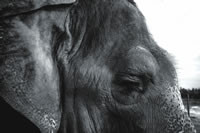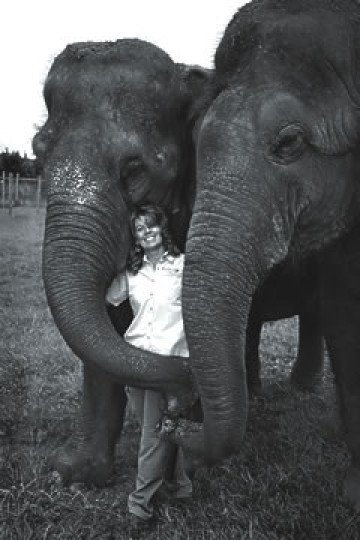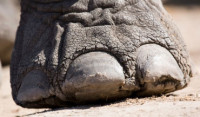SHARE:
Gray Matters - Elephant Breeding
Out in the central Florida hinterlands, the Ringling Bros. circus operates the most successful Asian elephant breeding operation on the continent.
 |
Elephant Care and Feeding Water: 30 to 50 gallons a day Food: 150 to 200 pounds a day of oat hay, complemented by grass, banana plants, apples, carrots, loaves of wheat bread and palm fronds Waste: The 30 elephants generate one ton of manure a day. It’s hauled away weekly in two 30-yard trash bins. Total annual per-elephant cost: $60,000 |
Williams — and Osgood — work at the Ringling Bros. and Barnum & Bailey Center for Elephant Conservation, a 200-acre spread southwest of Orlando that’s home to 30 elephants, the largest herd of Asian elephants in the hemisphere and the most diverse gene pool. With 20 births — a 21st is on the way — the breeding effort is the most successful Asian elephant breeding operation on the continent.
Out past horse stables and farmland near Polk City, down a long, unmarked, unpaved drive, the center is tough to find — by design. It’s closed to the public (except for the occasional education tour), but anyone who gets as far as the fence and locked gate will know quickly that he hasn’t blundered upon your typical central Florida ranch. There, striding across the Florida flatland, are groups of Asian elephants — smaller than their African counterparts and with smaller ears — separated into twos and threes in electric-wired paddocks.
| QUIZ Are elephants really afraid of mice? Test your knowledge with our interactive quiz |
As an elephant’s muted trumpet call sounds in the distance, Williams and Janice Aria, director of animal stewardship and training, provide details of elephant life and upkeep. The youngest elephant at the center is 18 months old; the oldest is over 61. There’s a reason the females here don’t move in one large herd as in the wild: Hierarchy would be settled the hard way — Mean Girls at about 9,000 pounds apiece. “Since we have them, it’s our responsibility really to give them a better life than they have in the wild,” Williams says.
Each female spends the night tethered next to a compatible female in the hulking barn that dominates the grounds. As in the wild, the five males are solitary. They spend the morning through late afternoon in individual barn enclosures behind steel pipe barriers 10 feet high; at night they’re funneled through gates and chutes to solo paddocks.
 Trudy Williams, 43, grew up around elephants. Her family owns them. Her uncle provided the elephants for the film Evan Almighty. [Photo: Jeffrey Camp] |
Vienna, Va.-based Feld Entertainment, the owner of Ringling Bros. and Barnum & Bailey Circus, whose winter quarters is in Tampa, built the center in 1995. Its stated mission is altruistic — conservation, breeding, scientific study and retirement. Numbering 35,000 to 50,000 in the wild and 14,000 to 15,000 domesticated, the Asian elephant is endangered. The elephant’s primary challenge is loss of habitat, but it has other troubles. It’s shot or poisoned as an agricultural pest that sometimes falls in violent conflict with humans. It’s been replaced as labor by mechanization. Poachers kill males for their tusks. Reproduction is slow.
“I could see that if we didn’t do something with regard to conservation and breeding, elephants could become extinct in the wild,” says Ringling Bros. Chairman and CEO Kenneth Feld.
In addition to paying the Ringling center’s $5-million construction tab, the circus takes about 5% of each circus ticket sale to pay the center’s $1.8 million operating budget and to fund conservation efforts in Sri Lanka. Ringling also funded for two years a Smithsonian lab dedicated to studying a herpes strain that’s taking a harsh toll on elephants. “I don’t believe there’s anybody else who can raise Asian elephants as well as we can. It’s just sort of our way of giving back that other entities can’t do,” Feld says.
Ringling’s efforts are well-regarded by zoos, says Mike Keele, deputy director of the Oregon Zoo and head of the animal’s species survival plan for the American Association of Zoos and Aquariums. “Overall, the industry thinks they’re doing good things for elephants.”
























